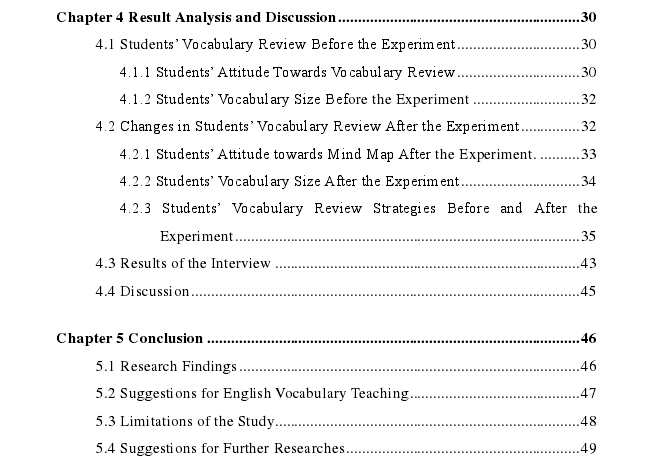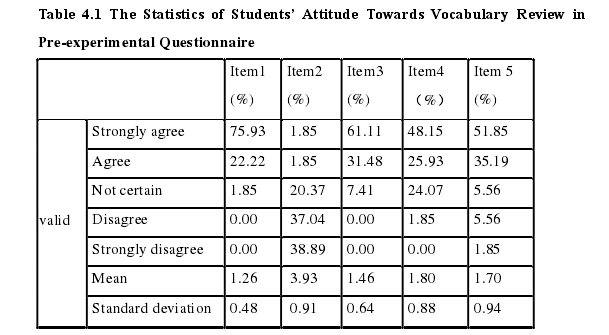英语论文哪里有?笔者认为思维导图在英语词汇复习中的应用不仅可以帮助高三学生有效地扩大词汇量,而且可以提高拼写单词的准确性,这对高三学生准备高考至关重要。因为词汇量的增加,他们在翻译和写作方面做得更好。此外,完形填空的能力也得到了提高。此外,学生可以通过前缀或后缀猜出一些不熟悉的单词的意思,这有助于他们进一步理解课文。
Chapter 1 Introduction
1.1 Background of the Research
In 2017, the English Curriculum Standard for Senior High Schools (2017 edition) issued by the Ministry of Education explicitly puts forward developing students' subject core competences, including language competence, culture consciousness, thinking quality and learning ability. Language competence refers to the ability to understand or to express meanings in ways such as listening, speaking, reading, writing, and viewing in social situations as well as language consciousness and language sense in the course of learning and using English language. It forms the basic elements of the core competencies of the English subject. Its improvement can not only help cultivate students’ cultural awareness, thinking quality and learning ability but also help students expand their global outlook as well as thinking mode and carry out cultural exchanges. To meet above demands, students need to master a large size of vocabulary. The Curriculum requires students to master more than 3000 words in addition to lexical phrases or phrases. Apart from these, the Curriculum demands that English teaching should focus on further enlarging students’ size of vocabulary, improving the ability to use vocabulary accurately and understand expressions exactly. At present, the size of vocabulary of senior high school students, especially Senior three students in the author’s school, is far from the requirements of Curriculum Standard (2017) and Examination Outline (2019). Due to the lack of vocabulary, students can not understand articles correctly. Besides, they can not express themselves correctly when writing. Most students are struggling to find a suitable way to learn vocabulary. Under the influence of memory rules, students will constantly forget the words they have learned. Therefore, scientific methods should be adopted to strengthen students' short-term memory and transform it into long-term memory so as to reduce forgetting and improve the memory effect. Review is the best way to strengthen their memory.

Chapter 3 Research Design
3.1 Research Questions
Guided by High School English Curriculum Standards, this study applies Mind Map to the teaching of English vocabulary for Senior three students and mainly does research to find the answers to the following two questions:
Question 1: What influence does the application of Mind Map in vocabulary review teaching have on the size of vocabulary of Senior three students?
Question 2: What influence does the application of Mind Map in vocabulary review teaching have on vocabulary learning strategies of Senior three students?
This research will take the students from a high school in Zhengzhou as the research object. The advantage of picking the third year of high school is that Senior three students are familiar with English teaching modes, and have mastered a certain size of vocabulary, so they can review in a wider range. The research subject of this experiment is the students from Class 13, Grade 3 and Class 14, Grade 3 in Zhengzhou No. 2 Senior Middle School. Class 13 was selected as the control class and Class14 as the experimental class, both of which include 54 students. The reason why the two classes are chosen are as follows: according to the scores of the final English exam of Senior two and the evaluation of the English teacher, the average score of the Language test was the closest, and the basic situation of the students was the most similar. On the one hand, both classes are taught by the same teacher (author), and the two classes have the same learning progress, use the same teaching materials and allocate the class hours consistent;
Chapter 4 Result Analysis and Discussion
4.1 Students’ Vocabulary Review Before the Experiment
To be clear about students’ attitude towards vocabulary review and the level of students’ vocabulary size before the experiment, the author did the following analysis:
4.1.1 Students’ Attitude Towards Vocabulary Review
First, the author analyzed students’ attitude towards vocabulary review in pre-experimental questionnaire.

About students’ attitude towards vocabulary review, there are five items:
Item 1: I think reviewing vocabulary is important for learning English well.
Item 2: I am interested in reviewing vocabulary.
Item 3: I need to get strategy training on reviewing vocabulary.
Item 4: I wish my teacher to change her teaching method so that reviewing vocabulary can be efficient.
Item 5: I wish to change the present way to review vocabulary by rote.
4.2 Changes in Students’ Vocabulary Review After the Experiment
To figure out whether students have changed in vocabulary review after the experiment, the author conducted the following analysis:
4.2.1 Students’ Attitude towards Mind Map
After the Experiment. After a term’s training of drawing Mind Map when reviewing vocabulary, students gradually show interest in Mind Map and their attitude towards Mind Map is positive as a whole. The statistics are as follows:
Above 7 items investigate students' attitude towards Mind Map after the experiment. As shown in Table 4.3, students’ attitude towards Mind Map is optimistic.
As for the first item and the fourth item, the mean of it is 3.00>2.50. 66.64% of the students don’t think it is hard to create mind maps. It shows that the majority students have no difficulty creating Mind Map. Besides, the mean of the fourth question is 3.28>2.5 and 55.55% of the students don’t think creating Mind Map is a boring experience. That means the most of the students like creating Mind Map. For the third item, 61.11% enjoy creating mind maps and the mean of it is 2.44<2.5. That is to say, most students accept Mind Map and they have mastered how to create Mind Map and show great interest in creating Mind Map after training.
Chapter 5 Conclusion
5.1 Research Findings
After a term’s research, by analyzing the questionnaire, tests as well as interview, it can be found that: Firstly, Mind Map can not only promote students’ English vocabulary review and greatly enhance their memory effect of words but also expand the students’ vocabulary.
The application of mind map in the English vocabulary review not only can help Senior three students expand vocabulary effectively but also improve the accuracy of spelling words, which is vital to Senior three students in preparing for the College Entrance Examination. Because the increase in the size of vocabulary, they did better in translation and composition. In addition, the ability to do cloze has been improved. Besides, students can guess the meaning of some words that they are not familiar with by prefix or suffix, which helps them further understand the text.
The process of reviewing vocabulary is difficult, time-consuming. Before the experiment, their reviewing was ineffective, which led to their low motivation for vocabulary review, but after the experiment, combining Mind Map and vocabulary review strategies effectively can not only change their attitude, but also improve their performance.
reference(omitted)

